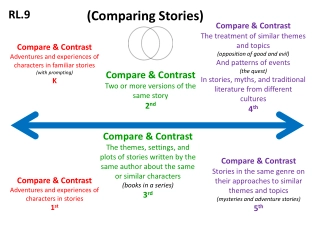
Legendary Love Affairs of Greek Gods in Mythology
Explore the captivating tales of love and desire in Greek mythology involving the Olympian gods Apollo, Aphrodite, and Ares. From Apollo's pursuit of Daphne to Aphrodite's romances with Adonis and Ares, delve into the intriguing relationships that shaped ancient Greek lore.
Download Presentation

Please find below an Image/Link to download the presentation.
The content on the website is provided AS IS for your information and personal use only. It may not be sold, licensed, or shared on other websites without obtaining consent from the author. If you encounter any issues during the download, it is possible that the publisher has removed the file from their server.
You are allowed to download the files provided on this website for personal or commercial use, subject to the condition that they are used lawfully. All files are the property of their respective owners.
The content on the website is provided AS IS for your information and personal use only. It may not be sold, licensed, or shared on other websites without obtaining consent from the author.
E N D
Presentation Transcript
Apollo The Greek god Apollo is legendary in mythology for his love affairs. From his fruitful flings with Coronis and Calliope, to his notorious pursuit of Daphne, the objects of Apollo's desire are the stuff of myth and legend. However, the god of archery sometimes missed his mark, and fell in love (or was it lust?) with the wrong person. These tales of unrequited love read like a who's who of mythological mishaps - but they are also some of the most compelling stories in Greek mythology. The list that follows includes some of the loves of Apollo. Cassandra Cassandra | Apollo gave Cassandra the gift of prophecy, but when she refused to return his affections, the god's gift became a curse Calliope Calliope | the lovely Muse Calliope is traditionally credited with bearing one of Apollo's famous offspring, the poet and singer Orpheus Coronis Coronis | this mortal woman became the mother of Apollo's son Asklepios - but her relationship with the god had tragic consequences Daphne Daphne | the nymph Daphne earned her place in Greek legend when she fled from the unwelcome advances of Apollo Hyacinthus Hyacinthus | a handsome youth who caught the eye of Apollo, Hyacinthus also became the unfortunate victim of a deadly accident... Sibyl of Cumae Sibyl of Cumae | the legendary Sibyl of Cumae became the victim of Apollo's anger when she rejected the god's amorous attentions
Aphrodite, the Greek goddess of love, beauty, and fertility, played a significant part in mythology. In her role as the patron deity of love, she assisted both human and divine lovers. Indeed, Aphrodite was involved with bringing together one of the most famous couples in Greek myth - Paris and Helen. However, the goddess of love appears also to have enjoyed her work on a more personal level. She indulged in many affairs herself with mortals and immortals alike. And the relationships of Aphrodite are, not surprisingly, popular subjects in myth and legend. The list that follows includes some of the loves of Aphrodite. Adonis Anchises was the birth of the hero Aeneas Ares myth and literature Dionysos love? - a child (Priapus) is conceived Hephaistos union (the numerous affairs of Aphrodite are but one indication of this fact) Hermes and in the end Aphrodite gave birth to Hermaphroditus Adonis | Aphrodite could not resist the charms of handsome Adonis - but the couple's relationship had a tragic ending Anchises | according to mythology, Zeus made Aphrodite fall in love with the mortal Anchises; the result of this union Ares | the passionate affair between Ares (the god of war) and Aphrodite (the goddess of love) was legendary in Greek Dionysos | what happens when Dionysos, the frenzied god of wine, has a fling with Aphrodite, the fertile goddess of Hephaistos | although the god Hephaistos was Aphrodite's husband in Greek myth, the marriage was not a successful Hermes | the Olympian god Hermes concocted a clever scheme in order to demand Aphrodite's amorous attentions,
Ares The fierce god Ares was often inflamed with lust in Greek mythology - lust for battle, that is. Indeed, it is fair to say that Ares was obsessed with war, almost to the exclusion of anything else. The god did, however, have an eye for the female form, and his appetite for Aphrodite, the alluring goddess of love and beauty, at times almost rivaled his desire to do battle. In consequence his conquests off the battlefield are nearly as legendary as his victories and defeats in combat. So let us learn more about the passionate loves of Ares. Aphrodite Aphrodite | the beautiful Greek goddess of love certainly snared the god of war with her irresistible charms - the pair together conceived several children, including Deimos, Phobos, and Harmonia Cyrene Cyrene | as a result of her affair with Ares, the nymph Cyrene gave birth to a son named Diomedes Eos Eos | the Greek goddess of the dawn engaged in an ill-advised tryst with Ares, which ended badly for Eos when Aphrodite discovered the relationship Pyrene Pyrene | some sources for mythology state that Ares and Pyrene were the parents of Cycnus Sterope Sterope | Sterope was one of the Pleiades (daughters of Altas and Pleione), and according to some versions of the tale, she was a lover of Ares and the mother by him of Oenomaus
Artemis There are several tales that describe the swift and terrible retribution of Artemis. One of the most revealing of these stories involves the youth Actaeon. In addition, Artemis was also responsible for punishing the nymph Callisto. In myth, Callisto was at one point a follower of the virgin goddess, but when she became involved in an affair with the god Zeus, Artemis had her revenge on the unfortunate nymph. The Moon Goddess The Moon Goddess In myth, Artemis is sometimes identified with Selene, the Greek goddess of the moon. Indeed, this association between Artemis and the moon is revealed in one of the epithets used to describe the goddess - Phoebe ("the bright one").
Athena The story of her contest with Poseidon for the city of Athens: according to the legend, both deities wanted Athens as the site of their primary sanctuary. In order to settle the duel in his favor, Poseidon created a spring from which salt water flowed. However, Athena responded by conjuring up an olive tree on the Athenian Acropolis, and this second divine gift was judged by the people to be the more useful. This contest was immortalized on that magnificent Athenian monument, the Parthenon, a temple that was dedicated to the goddess Athena. The myth appeared on one of the pediments of the temple, while the birth of the goddess was depicted on the other. One intriguing example is the tale of Arachne and her challenge to the goddess who was considered the patron of crafts. The story itself demonstrates the ancient Greek belief that one ought not compare oneself with the gods, lest a deity should suddenly materialize and punish the offending mortal. This comparison to the gods even had a term: it was hubris, which means, roughly, excessive pride. There are indeed many other stories in Greek mythology in which a human is punished by the gods for his or her arrogance, including several that involve Athena herself. For it appears that even the gods were not immune to those human traits of envy, desire, and jealousy. One of the myths that illustrates this fact well deals with the ill-fated Medusa, who claimed that she was more beautiful than Athena. Bad idea, Medusa....
Demeter Perhaps the most poignant of these myths is the so-called Homeric Hymn to Demeter, in which the story of the goddess and the loss of her daughter Persephone is told. The Hymn to Demeter is thought by scholars to be not only a myth about the abduction of Persephone and the consequent anger of Demeter - it also alludes to aspects of the mystery cult referred to as the Eleusinian Mysteries. This cult falls more properly into the realm of Greek religion, rather than myth, so it will not be discussed it in any detail here. However, as it is an integral aspect of the worship of Demeter, it should at least be mentioned in this context. In addition to the myth of Demeter and her daughter Persephone in the Homeric Hymn to Demeter, another intriguing tale that involves the goddess of fertility is her affair with the mortal Iasion. According to the version told by the poet Hesiod, Demeter and the hero "coupled with passion on a field plowed three times, in the rich soil of Crete." Apparently, this legendary liaison with Iasion was quite a fruitful one, for Demeter became pregnant and eventually bore her human lover a son named Plutus. The goddess Demeter was known as Ceres in Roman mythology.
Dionysus One of numerous Homeric hymns tells the tale of the abduction of Dionysos by pirates. The pirates, seeing how gloriously (indeed, divinely...) handsome this young man was, impetuously seized him and dragged him to their black ship. In their greedy minds, the brigands thought that the god was a human prince who could be held for ransom, so they attempted to bind him firmly and carry him away. To their utter surprise, the bonds and shackles could not hold the young man, and would slip off, leaving the darkly handsome youth with a mysterious smile. Only one of the pirates - the helmsman - recognized the true nature of the captive, and shouted with alarm to his fellows: "We have not a man, but a god in our midst!" But the others refused to heed him, and continued with their mad plan of capturing the son of Zeus. Setting sail, the group of thieves were astounded by a series of miraculous events: first, the ship was filled with wine, running like a river before their eyes; next, from the ship sprouted vines heavy with luscious grapes, and tendrils of the vine wrapped themselves around the sails like garlands. Upon seeing these wonders, the crew finally realized that they held no ordinary prisoner, but indeed a divine creature, and ordered the helmsman to return to shore. But Dionysos had still more in store for the disbelieving pirates, for suddenly he transformed himself into a fierce lion. The lion attacked the captain of the ship, and seeing this, the remaining crew sought to escape by jumping overboard. As they did this, they were changed into dolphins by the god. Only the helmsman, who had recognized the divinity of Dionysos, was spared, and the deity spoke to that man: "Courage! ... you are dear to my heart. I am loud-roaring Dionysos, born of the daughter of Kadmos, Semele, who mingled in love with Zeus."
Hera Hera, the queen of the Olympian gods, appears both in the Iliad and the Odyssey of Homer, as was previously noted. In these two epics, the identity of Hera is codified, in that her personality is revealed in a series of events. Perhaps the most compelling of these epic episodes is the scene in the Iliad where Hera manipulates her husband Zeus. Here, the goddess does indeed employ her feminine wiles and beauty to accomplish her goals. A summary of this story follows. Hera, wishing to influence the outcome of the war between the Greeks and Trojans, realized that she must in some way distract Zeus from monitoring the battle (you see, the Olympian gods were meddling in the affairs of the humans involved in the Trojan War, much to the annoyance of Zeus). So the goddess devised a plan - she decided that she must seduce her husband. After the seduction was accomplished, Zeus would fall sleep, and she and the other gods would then be free to interfere. In order to achieve her goal, Hera engages in some serious preening, which the poet Homer delights in describing in detail. Then, gilding the lily, the queen of the gods asks the goddess of love if she can borrow Aphrodite's powers of Love and Desire. Hera deceives Aphrodite, however, by claiming that she would use these invincible powers to end a quarrel between the Titans. Aphrodite, apparently fooled, agrees, and lends Hera her magic girdle. Thus armed, Hera proceeds with her scheme. She cleverly attempts to enlist the assistance ofHypnos, the god of Sleep. But Hypnos, who has interfered in the affairs of the Olympians before, hesitates. That is, until Hera offers him one of the comely Graces as a bride - with this incentive, how could the god refuse? In a deft bit of description, Homer then relates how the pair of deities travel together to find Zeus, and upon reaching him, how Hypnos transforms himself into a songbird while Hera begins the seduction of her husband. The goddess Hera was known as Juno in Roman mythology.
Hermes role | god of merchants; messenger of Zeus symbols | caduceus (kerykeion), winged boots [According to Hesiod] "Hermes was the son of Zeus and Maia. He presided over commerce, wrestling, and other gymnastic exercises, even over thieving, and everything, in short, which required skill and dexterity. He was the messenger of Zeus, and wore a winged cap and winged shoes. He bore in his hand a rod entwined with two serpents, called the caduceus.Hermes is said to have invented the lyre. He found, one day, a tortoise, of which he took the shell, made holes in the opposite edges of it, and drew cords of linen through them, and the instrument was complete. The cords were nine, in honor of the nine Muses. Hermes gave the lyre to Apollo, and received from him in exchange the caduceus." from Bulfinch's Mythology In Roman mythology, the god Hermes was called Mercury.
Poseidon Possibly because of the association between violent storms and the sea, Poseidon was often depicted in mythology as an angry, turbulent god. There are several myths in which the sea god reveals his terrible temper. For instance, Poseidon was relentless in his persecution of Odysseus after the hero blinded the god's son Polyphemus (details of this tale can be found in the Odyssey, which is an epic poem by the Greek poet Homer). In addition, Poseidon was so furious with King Laomedon when he was denied payment for building the walls of Troy that the vengeful god sent a sea- monster to destroy the countryside as punishment.In addition to his reputation as a fighter, however, Poseidon was also a legendary lover. From his ill-fated affair with Medusa to his dalliance with the goddess Demeter, Poseidon proved that he could at times rival his notoriously promiscuous brother Zeus. Learn more about the lovers of Poseidon. The god Poseidon was known as Neptune in Roman mythology.
Zeus There are certainly other instances where Zeus is deceived (the incident with Prometheus being but one more good example). These examples only demonstrate that although he was the god who ruled Olympus and its divine denizens, he was subject to the laws of Fate and was not in fact all-powerful. And just as the other deities had their own personal foibles, Zeus too had a weakness - he was passionately fond of female charms. Many stories about Zeus recount his insatiable lust and notorious wandering eye, an eye that fell upon goddess and mortal woman alike. Some of the paramours of Zeus are: Alcmene Alcmene | mother of Herakles Danae Danae | mother of Perseus Europa Europa | mother of Minos, Rhadamanthys, & Sarpedon Io Io | mother of Epaphus Leda Leda | mother of Helen Leto Leto | mother of Apollo and Artemis Maia Maia | mother of Hermes Metis Metis | mother of Athena Mnemosyne Mnemosyne | mother of the Muses Semele Semele | mother of Dionysos
Hephaistos role | god of smiths and metal-workers symbols | axe Hephaistos in Greek Mythology Hephaistos in Greek Mythology "Hephaistos [Hephaestus], the celestial artist, was the son of Hera. He was born lame, and his mother was so displeased at the sight of him that she flung him out of Olympus. Other accounts say that Zeus kicked him out for taking part with his mother in a quarrel which occurred between them. Hephaistos's lameness, according to this account, was the consequence of his fall. He was a whole day falling, and at last alighted in the island of Lemnos, which was thenceforth sacred to him." from Bulfinch's Mythology The god Hephaistos was identified with Vulcan in Roman mythology.
Symbols of the Olympians Aphrodite Aphrodite | sceptre, myrtle, dove Apollo Apollo | bow, lyre, laurel Ares Ares | spear Artemis Artemis | bow, deer Athena Athena | aegis, owl, olive tree Demeter Demeter | sceptre, torch, corn Dionysos Dionysos | grape vine, ivy, thyrsos Hephaistos Hephaistos | axe Hera Hera | sceptre, diadem, peacock Hermes Hermes | caduceus, winged boots Poseidon Poseidon | trident, horse, bull Zeus Zeus | thunderbolt, eagle, oak
Worship Sites Argos Argos - city sacred to the goddess Hera Athens Athens - city sacred to the goddess Athena Corinth Corinth - sacred to the god Poseidon & the goddess Aphrodite Cythera Cythera - sacred to the goddess Aphrodite Delos Delos - sacred to the god Apollo Delphi Delphi - Oracle of Apollo Dodona Dodona - Oracle of Zeus Ephesus Ephesus - sacred to the goddess Artemis Rhodes Rhodes - sacred to the god Helios Samos Samos - sacred to the goddess Hera Sparta Sparta - sacred to the Dioscuri (Castor and Polydeuces)






















